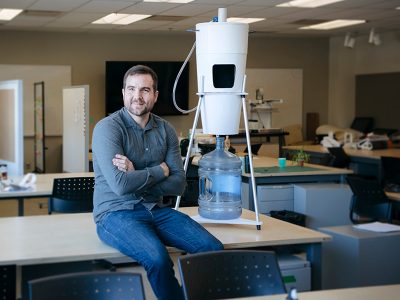By Joseph R. Mathieu
During fall 2021, the Faculty of Engineering and Design (FED) launched its new Women in Engineering & IT (WiE&IT) Program. One of the first of its kind in Canada, the program aims to help close the gender gap in science, technology, engineering and mathematics (STEM) industries through mentorship, networking and experiential learning. Sixteen industry and government partners support the program in its goals to change perceptions and foster interest in engineering, technology and innovation among women within Carleton’s community.
The lead sponsor of the program is Trend Micro, a global cybersecurity company that leads the industry in bolstering B2B cloud systems. In this profile, FED asks Amanda Friesen—a back end developer who has worked for GOLO Mobile and Ericsson who joined Trend Micro in 2020—5 questions about why she wanted to pursue a career in STEM and how she landed her current role.

Amanda Friesen, Back End Developer, Trend Micro
How and when did you know you wanted to pursue a career in STEM?
I applied to many universities with a lot of different programs. At the end of the day, the engineering science program at the University of Toronto won out. That’s where I first ran into programming, it was taught in three required courses in a couple low level languages, C and assembly, and used in the required robotics project course.
It was something that I clicked with because I really enjoyed using code to build something from nothing.
I ended up having to take several years off to recover from a bad vehicle accident, and then I played around with different jobs before I decided that I missed learning. I went back to school, to Concordia University in Montreal, where I completed a computer science degree.
It’s been a good choice because now I’m in an industry where continuous learning is probably about 50% of the job. Everything changes all the time and what you learn in school is just the start of what you learn throughout your career.
How did you find your current role at Trend Micro and what do you like most about it?
A coworker referred me to a recruiter that was working for Trend Micro. I’m not a super outgoing person and I’m not very good at talking to strangers. But if you spend time developing good relationships with coworkers or mentors then they can become resources to you down the line.
It’s hard to hire in the technology sector because it’s difficult to determine a candidates technical skills from a couple interviews. That’s why the referral systems are given so much weight.
What I like most about Trend Micro is that there’s a lot of very smart people here. It’s been a huge opportunity to learn from others. Trend Micro has set up good systems and best practices that give their employees a lot of room to grow.
What is your favourite thing about Trend Micro’s commitment to promoting women in STEM?
Trend Micro’s partnership with the WiE&IT Program at Carleton University is very exciting. Trend Micro is still a very male-dominated company, especially in its research and development division and at the management level. I hope there will be more initiatives like this in the future.
What’s one thing you think allies could do better when it comes to supporting women in STEM?
When I joined Trend Micro it was very intimidating. I was the only woman on a team of 15 men. That can make you wonder whether you’re supposed to be there.
I think it’s the responsibility of a workplace to be more affirmative in both their hiring practices and nurturing talent within their own company. They should make sure that the supports and structures are in place to allow talented individuals to rise through the ranks and break down barriers.
What’s the best piece of advice you have ever received as a woman in STEM?
A piece of advice I got second-hand from a female Chief Technology Officer (CTO) was this: don’t become a manager too early in your career.
Especially in software, women are often pushed into management early, because women are often seen as having better soft skills and weaker technical skills. If you go into management without building a solid technical foundation you can advance but it is very easy to lose respect when you are managing engineers who are dealing with technical issues beyond your experience.
There is a similar issue with women pushed into product management. I have seen a lot of former developers who became product managers who have a hard time getting back into programming. It can start early, a friend filled the position as an intern because the company didn’t think she had the skills yet to work on code, companies after graduation followed suite and it took her a year of job applications to find a development role. I have worked with a couple female product managers with computer science degrees who admitted they ended up in that career as they felt it was the only one open to them.
As a woman, if you step off the technical track it can be very difficult to come back to it. I would just make sure that when you do so, it’s because it’s what you want and not because of external pressure.
Thank You
The WiE&IT Program is possible because of the support of Trend Micro.

Wednesday, March 30, 2022 in Feature Stories, Women in Engineering
Share: Twitter, Facebook



